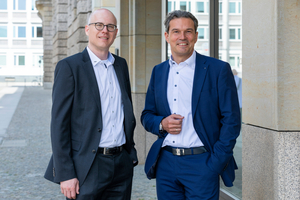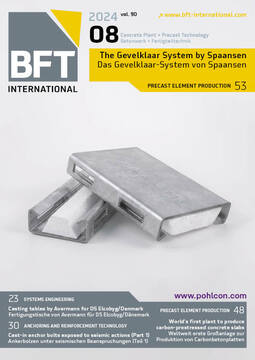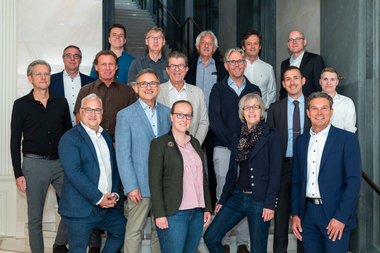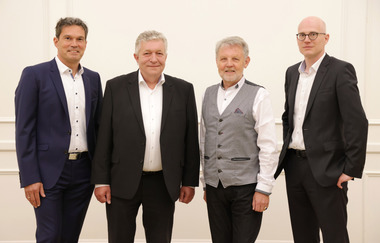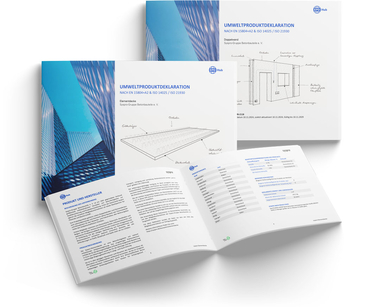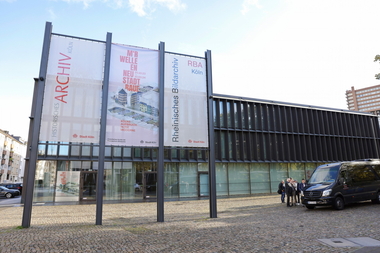Interview: „Turning point in the construction industry – even sustainability must pay off“
The current turnover figures in the construction industry and building materials industry give reason for concern: Lack of skilled labor, declining order volumes, increasing energy costs and a high interest phase with negative impact on investments form a mix that also faces the predominantly medium-sized member companies of the Syspro Gruppe Betonteile e.V. with considerable challenges. Moreover, the manufacturers of precast concrete elements need to align their productions so as to comply with the climate goals and sustainability requirements. Matthias Schurig, Chairman of the Executive Board at Syspro, and Dr. Thomas Kranzler, General Manager of the group, describe the motions, developments and perspectives in the industry segment of precast concrete products.
BFT International: Mr. Schurig, how much climate future is incorporated in the daily business of the precast concrete producers?
M. Schurig: Concrete is the foundation on which our society is built. Concrete still is without alternative in a lot of applications. Bridge and infrastructure construction cannot be successful without this building material. And serial housing construction in considerable sizes can also hardly be implemented without precast concrete elements.
Against this backdrop of structural requirements, climate change and growing tasks in terms of environmental protection are the standards that currently accompany our work. Efficiency enhancements, integration of functions and the further development of climate-friendly building materials are always on the account of each and every one of our projects in view of the climate neutrality we are aiming at. However, we cannot ignore these requirements at all: We always have to keep an eye on the equilibrium of functional possibilities, ecological advantages and economic framework conditions in order to survive economically.
BFT International: How much sustainability is still possible given the current economic challenges?
M. Schurig: Only companies, allowing for economical construction by means of climate-friendly products and sustainable technologies, will remain successful in the long run, too.
With our Syspro thermal walls, which we have already established in the market some years ago, we have fulfilled the highest requirements for a long time now that a good building material can provide to overcome the stuttering housing construction sector. Furthermore, the members of Syspro are working on additional innovations. At ours in Oschatz, one focus is on carbon-reinforced concrete, for example, the carbon fiber reinforcement of the same is considerably less susceptible to corrosion than steel. A very thin concrete cover of only one centimeter is sufficient with carbon-reinforced concrete. Steel as reinforcement material needs four to five times that much. Ultimately, this method saves an enormous amount of material at similar structural properties and comparable costs as steel reinforced concrete. Now, it is about the market launch: First milestone will be a school sports hall in Dresden for which we could lay the foundation together with Federal Building Minister Geywitz some weeks ago. Other Syspro members are dealing with composite construction made of wood and concrete, offering HVAC floor slabs where the pipe registers are already incorporated into the precast floor slabs close to the surface or reducing the concrete proportion in floor slabs by means of hollow cores.
BFT International: The production of concrete itself, however, is still regarded as hazardous to the climate, because it is dependent on the ‚climate killer‘ cement?
T. Kranzler: When it comes down to reducing the total footprint of carbon emissions in the production of our precast concrete elements close to zero, then there is no alternative to the decarbonization of the cement industry. But it is also quite clear – cement is a primary material for our members, that they buy externally. Relative to the total precast concrete production, cement is accounting for approx. 70 to 80 % of the carbon emissions at present. Therefore, we appreciate that the approval for carbon-efficient cements have reached a record level, according to information given by VDZ. This developments make me feel very optimistic. The amendment of the act on carbon dioxide storage and transport, the Federal Government has passed recently, is another milestone: Now, it is finally possible to build up a carbon dioxide infrastructure in Germany and to launch planning of a commercial carbon pipeline system. In the long term, the pricing of low-carbon cement and the concretes produced with them sustainably will decide on profitability in comparison to conventional alternatives.
The task for our members is to optimize the own concrete mix designs even more by using new cements for continuously reducing the carbon footprint more and more. An increasing use of recycled concrete and/or recycled aggregates will also play an increasingly important role against the backdrop of the conservation of resources. These are all goals, that we have set for ourselves with „Syspro 2030“.
Now, it is a matter of finding competent partners and, above all, driving the work for obtaining approval of such processes. Because such innovations only get economic perspectives through the classification as new sustainable products in the EU taxonomy. This could be crucial to set the carousel in motion for orders, investments and recruiting of skilled workers.
BFT International: Mr. Schurig, Dr. Kranzler, thank you very much for the interview!
CONTACT
Syspro-Gruppe Betonbauteile e. V.
Matthias-Grünewald-Str. 1-3
53175 Bonn/Germany

